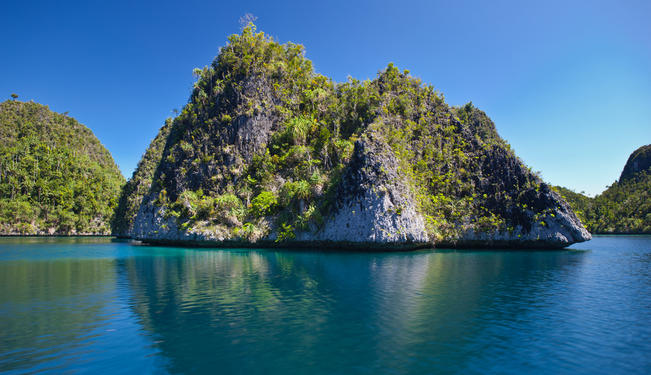
In the eyes of many, West Papua should be a country independent from Indonesia.
Background
While Papua New Guinea is a sovereign nation, few realize that the western half of the world’s second largest island is Indonesian territory. This resource-rich island is one of the least publicized places on earth, a place where the fight between modernity and tradition is still being waged — and with bloody consequences.
Although the island is recognized as Indonesian territory, Papuan natives are ethnically and linguistically distinctive. Native Papuans are recognized as Melanesian. Indonesians native to other islands, such as Sumatra or Java, fall instead within the Austronesian ethno-linguistic family. Despite thousands of years of regional commingling between Melanesians and Austronesians, the majority of Papua remained essentially isolated from any outside influence until the mid 20th century.
Papuan nationalism began to grow during World War II, with Japan’s seizure of the island in 1942 prompting a clash involving over 80,000 allied troops. Despite nearly 300 different languages being spoken amongst West Papuans alone, Papuan tribal society developed into a unified Papuan nationalism under foreign occupations. This resulted in the majority native Papuan “New Guinea Council,” which set forth the goal of Papuan independence in 1970. This was envisioned, at the time, as independence from the Dutch.
In 1945, Indonesia’s first president, Sukarno, declared Indonesian independence from Dutch rule. In seeing that Papua was an extension of the Dutch colony, Sukarno claimed Papua as part of the Indonesian nation. To forgo military engagement, the Dutch signed the New York Agreement of 1962, promising Papuans a fair referendum within six years to vote for either Papuan sovereignty or Indonesian rule.
Papuan aversion to Indonesian rule was clear from the beginning, and in 1965, it manifested itself in revolts known as the “West Papuan Spring” These revolts were short-lived, as they were consistently met with brutal retaliation from the Indonesian military. Nevertheless, the Free Papua Movement was born.
Why is the Free Papua Movement Relevant?
Aside from mass revolt, 1965 also saw Sukarno fall to Suharto, who then viewed the protests and instability as justification to allocate voting power in Papua’s referendum to a mere 1,025 men. Declared the “Act of Free Choice,” military records account that Papuans favored Indonesian citizenship. To this day, many Papuans instead call it the “Act of No Choice” — around 1,000 were hand picked by the military to represent a population of nearly 2 million.
Since the “Act of Free Choice,” the Free Papua Movement has persistently engaged in actions ranging from violent guerrilla operations to peaceful protest, civil disobedience, and flying the Morning Star — the flag symbolizing a Papua free from foreign rule. Having dealt with its fair share of separatist movements, the Indonesian government often labels the Free Papua Movement’s actions as terrorist threats. Thus, action is generally met with violent Indonesian military repercussions. There are, for example, documented cases of individuals receiving ten-year jail sentences for attending a Morning Star raising ceremony.
While Amnesty International, Human Rights Watch, and the United Nations have documented human rights violations in West Papua, the Indonesian government’s legal limitations on travel and persistence that the region’s dangers pose a threat to international journalists and NGOs have kept West Papua’s freedom movement out of the international media spotlight.
The Free West Papua Campaign was launched in Oxford, England, in 2004 and is led by exiled West Papuan independence leader, Benny Wenda. It hopes to bring international attention to human rights violations in Papua through peaceful campaigning. These human rights violations include failures of the Indonesian government on the island to address issues such as poverty, education, health, and development. The movement hopes to one day see the Morning Star flying freely amidst the tree tops of the island. They envision a fair, transparent, and fully representative referendum — one that they believe, if acted upon, would lead to a free and independent Papua.
Many Indonesians see Papua as one of their national strengths, as it legitimizes the national motto, “Unity in Diversity.” Many West Papuans, however, feel they have waited too long for freedom.
Image: Copyright © Shutterstock. All Rights Reserved
For more than 10 years, Fair Observer has been free, fair and independent. No billionaire owns us, no advertisers control us. We are a reader-supported nonprofit. Unlike many other publications, we keep our content free for readers regardless of where they live or whether they can afford to pay. We have no paywalls and no ads.
In the post-truth era of fake news, echo chambers and filter bubbles, we publish a plurality of perspectives from around the world. Anyone can publish with us, but everyone goes through a rigorous editorial process. So, you get fact-checked, well-reasoned content instead of noise.
We publish 2,500+ voices from 90+ countries. We also conduct education and training programs on subjects ranging from digital media and journalism to writing and critical thinking. This doesn’t come cheap. Servers, editors, trainers and web developers cost money.
Please consider supporting us on a regular basis as a recurring donor or a sustaining member.
Support Fair Observer
We rely on your support for our independence, diversity and quality.
Will you support FO’s journalism?
We rely on your support for our independence, diversity and quality.







